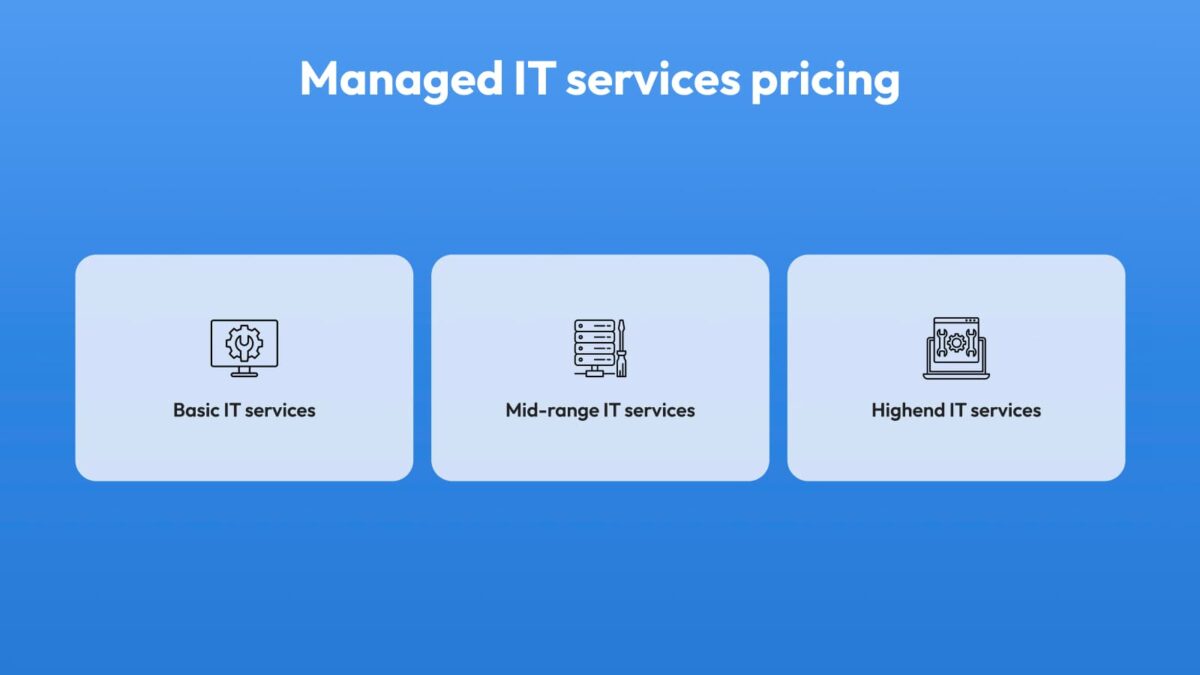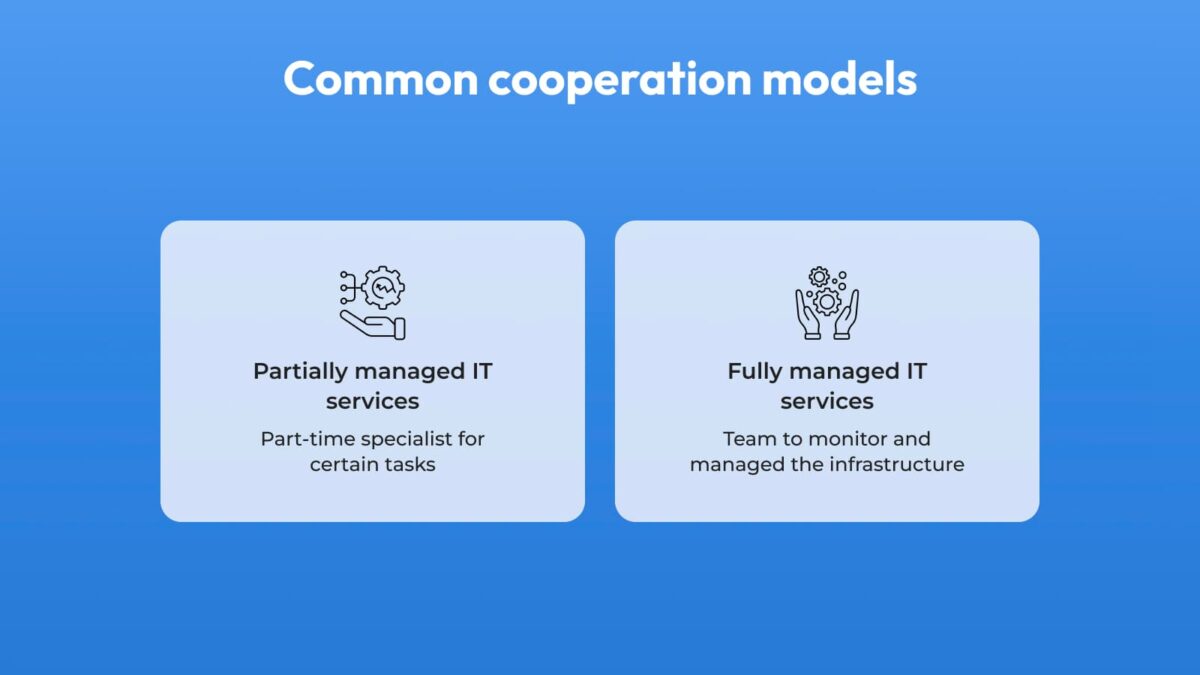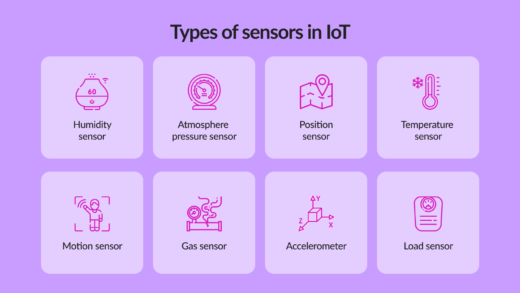As the complexity of tech solutions arises every year, business owners have to ensure outstanding intuitiveness and quality in a short time to keep strong positions in the market. Currently, one of the most widespread practices to get deep IT expertise and proficient software expert assistance, businesses entrust managed IT services.
In this post, we’ll understand the meaning of this method and define the main factors impacting the cost of managed IT services, key cooperation models, and forms of managed IT services agreements.
What Forms a Cost for Managed IT Services
Managed IT service stands for handling tasks touching software development to a third-party vendor. The software development company handles the software cloud infrastructure management, data backups, solution security demands, etc.
Advantages of a managed IT service approach include:
- Access to a wide talent pool of software experts
- More time for your in-house development team to focus on core tasks
- Cutting on time and cost
The managed IT services pricing mostly depends on your business goals and tech requirements for software to seamlessly accomplish these goals. Besides, most IT outsourcing partners allow you to augment your in-house team in case you need certain specialists and expertise.

Managed IT services may be classified by the level of tech complexity:
- Basic IT services. Here, the service provider only monitors your software, detects possible issues, and reports to you. This approach is brilliant you have the assistance of your in-house team. The cost for basic IT services is usually $70-$150/per month.
- Medium complexity IT services. By choosing this approach, you onboard a development team specialist to monitor the system and prevent collapses. Also, the team fixes the system if any tech issues occur. The price for medium complexity IT managed services is $50-$200/per month.
- Advanced IT services. In this case, the software partner provides you with the major part or the whole infrastructure. Such detailed assistance will cost you nearly $300 per month.
Popular Managed IT Services
Now, let’s undercover the most popular managed IT services among business owners:
Data backups
Robust safeguarding measures are a primary aspect that can impact the success and outcomes of software delivery. Besides, it’s vital to ensure outstanding data integrity, especially when managing and operation huge scopes of information. If you don’t establish an accurate data backup, it may result in loses with the client base and consequently may impact your budget. However, managed IT services may provide you with experts who are capable of setting up data backups automatically.
Server digitalization
Over time, it became obvious that physical hardware servers lack convenience. Server digitalization assists businesses by dividing physical servers into numerous virtual, engaging software apps. Each virtual server is autonomous and runs its own operational system. Such an approach has numerous benefits like high accessibility, reduced operational costs, and flexibility, and also facilitates better software performance.
On-site assistance
It often happens that businesses don’t have much expertise in organizing cloud infrastructure or at least don’t have niche-specific specialists nearby, so the most convenient path is to outsource managed IT services. Usually, DevOps specialists can analyze your software performance and offer strategies that may help improve it. One of the most common ways is to start using cloud services like AWS, leading to less resource spending.
Cooperation Models
Engaging managed IT services may be beneficial and also a convenient approach that is fully centered around your technical and project needs and requirements. Here are two options you can choose from: going part-time or full-time.
Part-time managed IT services
This approach will be a perfect match for you if you already have an in-house team but are seeking additional expertise to handle specific tasks. So, a particular expert will dedicate several hours a week or a day to help you support a specific part of an infrastructure.
Summing up, partially managed IT services is an option for you if:
- There is already an in-house team
- You seek unique, narrow expertise
- Some part of the work has to be done by a specific deadline
Completely managed IT services
Fully managing IT services is a great chance for small and medium-sized companies to extract the best outcomes out of software performance. A software provider with high-end tech expertise may assist you in the selection of the proper specialist for the specific work scope. By reaching out to offshore experts, you can significantly save up on investments as you won’t need to form and maintain an in-house team.
So, when who needs fully managed IT services:
- Businesses that don’t have an in-house team
- Businesses that need advice and support while creating and handling software

How Much Managed IT Services Cost
It’s very difficult to predict the exact pricing for managed IT services for your specific project. However, you’re probably still questioned about what are the main price-driving factors for managed IT services. Let’s find out below:
- Solutions complexity. For sure, the more complex the design, solution architecture, and functionality, the more it will cost.
- Development team structure. Cooperation with in-house specialists will cost you more, as you’ll need to maintain a development team and spend plenty of time on hiring. Searching for specialists offshore may help you avoid budget constraints due to the fast onboarding process and almost no operational costs needed.
- Outsourcing region. The pricing for the provided software-related services may significantly differ. For example in North America, you’ll get quite high-level expertise, but rates are high and range from $100-$200 an hour. While in Asia you’ll meet sweet numbers, approximately $20-50 an hour, but the quality may not be satisfying.
- Specialists’ proficiency. DevOps engineers’ skillfulness is qualified differently and may be divided into three categories: junior, middle, and senior. So the experts’ qualification level directly impacts the cost and services they’re capable of providing.







